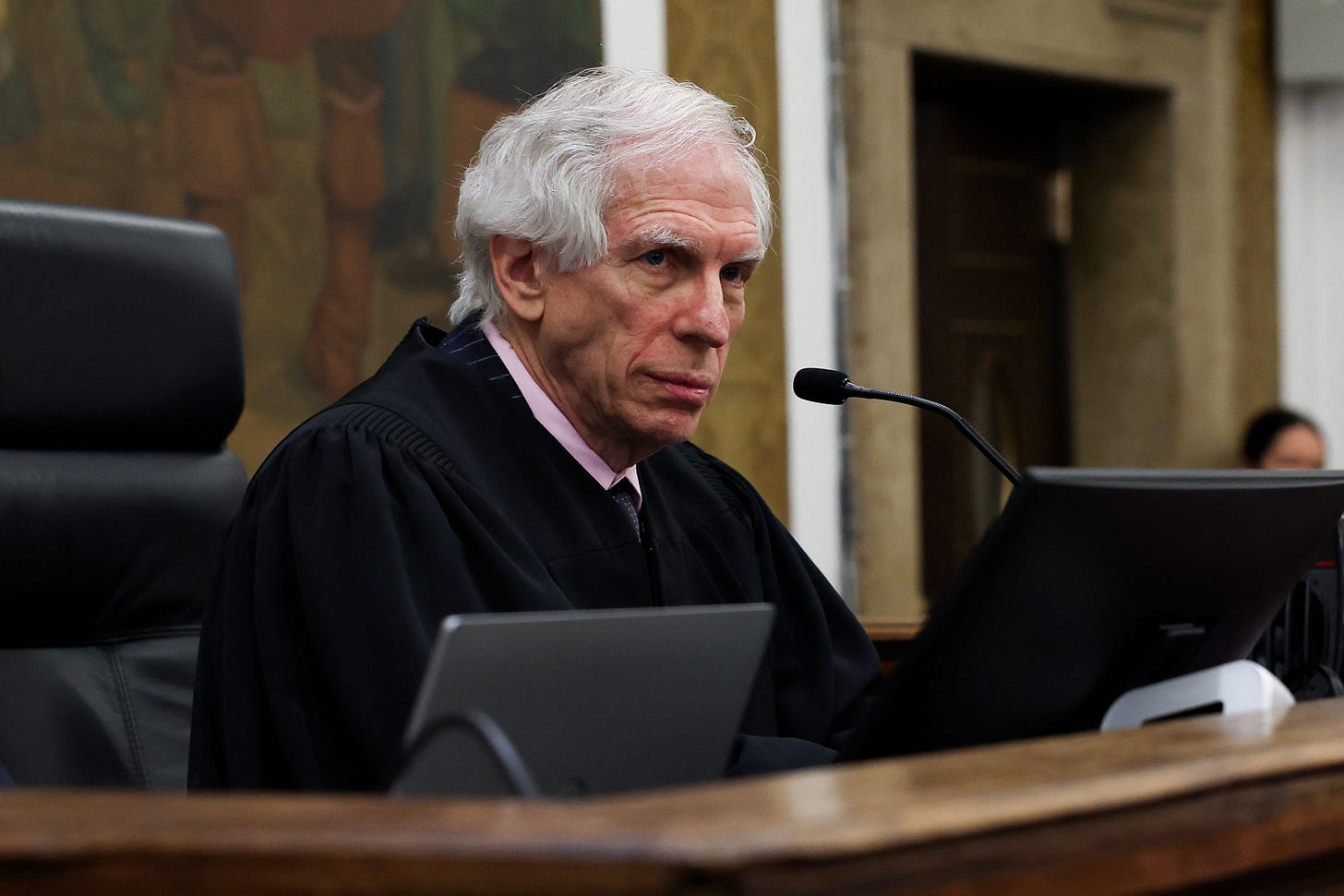Fraudster Trump Fined $354 Million and Barred from Business in New York
Justice Engoron’s ruling notes Trump’s long “history of corporate malfeasance” and borderline “pathological” lack of contrition.

ON FRIDAY, JUSTICE ARTHUR ENGORON of the New York Supreme Court issued a stunning 92-page ruling slapping former President Donald Trump with a $354 million penalty for multiple fraud-related charges—plus millions more in interest. The decision also bans Trump and his two sons from “serving as an officer or director of any New York corporation or other legal entity in New York for a period of three years.” Donald Trump Jr. and Eric Trump were each ordered to pay over $4 million, as well. Coupled with the verdicts against Trump for defaming E. Jean Carroll, that leaves him with a nearly half-a-billion-dollar bill for civil wrongdoing—without even getting to trial on the 91 criminal counts pending against him in four different courts.
Trump responded to Engoron’s ruling with tired Truth Social trademarks—“WITCH HUNT” and a “Complete and Total SHAM.” Undoubtedly his MAGA groupies won’t read a word of the decision, on which he’s already begun fundraising. But for people who care about the truth, the ruling contains some nuggets of facts and rhetoric that operate as a temporary antidote to Trump’s nonstop gaslighting.
The eight-count civil case was brought by New York Attorney General Letitia James, alleging that Donald Trump, his sons, other Trump Organization officials, and the companies he controls borrowed massive amounts of money from banks and other lenders based on heaps of paper containing lies about the financial condition of his properties. Trump himself also executed personal guarantees. The $354 million number derives from what Engoron called “ill-gotten gains,” that is, the amount Trump saved by securing lower interest rates by inflating the value of his assets, duping banks into believing he was a less risky borrower than he actually is. Think of an interest rate on a mortgage—people with poor credit and no collateral will pay higher variable rates than a purchaser with millions in assets who is a sure bet to pay back a loan.
Engoron ticked through and blew apart Trump’s defenses, one of which had to do with the fact that appraisers can differ on the value of a piece of real estate, and that the valuation of real estate is more of an art than a science. The judge agreed: “Absolute perfection, including with numbers, exists only in heaven.” But that’s not what was going on here: “The frauds found here leap off the page and shock the conscience.” For example, Trump “was aware that the Triplex apartment in which he, a real estate mogul and self-identified expert, resided for decades was not 30,000 square feet, but actually 10,996 square feet.” Trump “was aware that he had permission to build only 500 private residences” in Aberdeen, Scotland, but falsely “represented that he had permission for 2500.” And Trump “was aware that 40 Wall Street was operating at a deficit despite proclaiming that it was running a net operating income of $64 million.”
Engoron also rejected Trump’s attempts to shift the blame onto his accountants (who were hired not to conduct audits, but instead to crunch numbers based on information provided by the defendants), and onto the lenders and insurance companies for relying on his lies (reliance isn’t something New York law cares about). This isn’t Trump’s “first rodeo” of fraud, either, Engoron noted. Trump was sued in 2019 for fraud in the marketing and operation of “Trump University,” settling the case for $25 million. He was sued in 2018 for legal violations relating to the supposedly charitable Donald J. Trump Foundation, agreeing to dissolve it as part of settling that case. And in 2022, Trump settled with the attorney general for Washington, D.C., over allegations that the tax-exempt organization that set up his inauguration, the 58th Presidential Inaugural Committee, overpaid him through his Trump Old Post Office LLC—the company he set up to operate the historical building that housed a Trump hotel during his presidency, a building that he could not have purchased but for the lies about his financial condition.
Back in November, when Engoron issued his first fraud ruling against Trump, he appointed a retired judge to act as an “independent monitor” of the Trump entities. She will continue to be in charge pending an appeal. In a report to Engoron, she concluded that the defendants have been manufacturing their own valuations, transferring assets without notifying her, and submitting financial disclosures that missed important information. In other words, the shenanigans only continue. Engoron noted with disgust that Trump and company have exhibited a “complete lack of contrition and remorse” that “borders on pathological.”
This will be a difficult case for Trump to get reversed on appeal.
Meanwhile, as a precondition to filing that appeal, Trump will have to secure a bond to cover the judgment, which will probably require him to put up some collateral—either cash or assets, the value of which he has repeatedly lied about. The walls are closing in on Donald Trump. Too bad Republican voters aren’t noticing.



